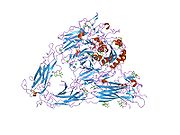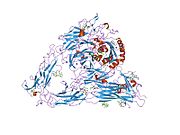Integrin alpha-V is a protein that in humans is encoded by the ITGAV gene.[5]
Function
ITGAV encodes integrin alpha chain V. Integrins are heterodimeric integral membrane proteins composed of an alpha chain and a beta chain. Alpha V undergoes post-translational cleavage to yield disulfide-linked heavy and light chains, that combine with multiple integrin beta chains to form different integrins. Among the known associating beta chains (beta chains 1,3,5,6, and 8; ITGB1, ITGB3, ITGB5, ITGB6, and ITGB8), each can interact with extracellular matrix ligands; the alpha V beta 3 integrin, perhaps the most studied of these, is referred to as the Vitronectin receptor (VNR). In addition to adhesion, many integrins are known to facilitate signal transduction.[6]
Alpha V class integrins
In mammals the integrins that include alpha-V are :
| Name | Synonyms | Distribution | Ligands |
|---|---|---|---|
| αVβ1 | neurological tumors | vitronectin; fibrinogen | |
| αVβ3 | vitronectin receptor[7] | activated endothelial cells, melanoma, glioblastoma | vitronectin,[7] fibronectin, fibrinogen, osteopontin, Cyr61, thyroxine[8][9] |
| αVβ5 | widespread, esp. fibroblasts, epithelial cells | vitronectin and adenovirus | |
| αVβ6 | proliferating epithelia, esp. lung and mammary gland | fibronectin; TGFβ1+3 | |
| αVβ8 | neural tissue; peripheral nerve | fibronectin; TGFβ1+3 |
Clinical significance
Overexpression of the ITGAV gene is associated with progression and spread of colorectal cancer,[10] and prostate cancer.[11]
As a drug target
The mAbs intetumumab, and abituzumab target this protein which is found on some tumour cells.[12]
See also
References
- ^ a b c GRCh38: Ensembl release 89: ENSG00000138448 – Ensembl, May 2017
- ^ a b c GRCm38: Ensembl release 89: ENSMUSG00000027087 – Ensembl, May 2017
- ^ "Human PubMed Reference:". National Center for Biotechnology Information, U.S. National Library of Medicine.
- ^ "Mouse PubMed Reference:". National Center for Biotechnology Information, U.S. National Library of Medicine.
- ^ Sosnoski DM, Emanuel BS, Hawkins AL, van Tuinen P, Ledbetter DH, Nussbaum RL, et al. (June 1988). "Chromosomal localization of the genes for the vitronectin and fibronectin receptors alpha subunits and for platelet glycoproteins IIb and IIIa". The Journal of Clinical Investigation. 81 (6): 1993–1998. doi:10.1172/JCI113548. PMC 442653. PMID 2454952.
- ^ "Entrez Gene: ITGAV integrin, alpha V (vitronectin receptor, alpha polypeptide, antigen CD51)".
- ^ a b Hermann P, Armant M, Brown E, Rubio M, Ishihara H, Ulrich D, et al. (February 1999). "The vitronectin receptor and its associated CD47 molecule mediates proinflammatory cytokine synthesis in human monocytes by interaction with soluble CD23". The Journal of Cell Biology. 144 (4): 767–775. doi:10.1083/jcb.144.4.767. PMC 2132927. PMID 10037797.
- ^ Bergh JJ, Lin HY, Lansing L, Mohamed SN, Davis FB, Mousa S, et al. (July 2005). "Integrin alphaVbeta3 contains a cell surface receptor site for thyroid hormone that is linked to activation of mitogen-activated protein kinase and induction of angiogenesis". Endocrinology. 146 (7): 2864–2871. doi:10.1210/en.2005-0102. PMID 15802494.
- ^ Schmohl KA, Han Y, Tutter M, Schwenk N, Sarker RS, Steiger K, et al. (December 2020). "Integrin αvβ3-dependent thyroid hormone effects on tumour proliferation and vascularisation". Endocrine-Related Cancer. 27 (12): 685–697. doi:10.1530/ERC-20-0353. PMID 33112795.
- ^ Waisberg J, De Souza Viana L, Affonso Junior RJ, Silva SR, Denadai MV, Margeotto FB, et al. (October 2014). "Overexpression of the ITGAV gene is associated with progression and spread of colorectal cancer". Anticancer Research. 34 (10): 5599–5607. PMID 25275062.
- ^ Cooper CR, Chay CH, Pienta KJ (2002). "The role of alpha(v)beta(3) in prostate cancer progression". Neoplasia. 4 (3): 191–194. doi:10.1038/sj.neo.7900224. PMC 1531692. PMID 11988838.
- ^ Élez E, Kocáková I, Höhler T, Martens UM, Bokemeyer C, Van Cutsem E, et al. (January 2015). "Abituzumab combined with cetuximab plus irinotecan versus cetuximab plus irinotecan alone for patients with KRAS wild-type metastatic colorectal cancer: the randomised phase I/II POSEIDON trial". Annals of Oncology. 26 (1): 132–140. doi:10.1093/annonc/mdu474. PMID 25319061.
Further reading
- Horton MA (May 1997). "The alpha v beta 3 integrin "vitronectin receptor"". The International Journal of Biochemistry & Cell Biology. 29 (5): 721–725. doi:10.1016/S1357-2725(96)00155-0. PMID 9251239.
- Porter JC, Hogg N (October 1998). "Integrins take partners: cross-talk between integrins and other membrane receptors". Trends in Cell Biology. 8 (10): 390–396. doi:10.1016/S0962-8924(98)01344-0. PMID 9789327.
- Sajid M, Stouffer GA (February 2002). "The role of alpha(v)beta3 integrins in vascular healing". Thrombosis and Haemostasis. 87 (2): 187–193. doi:10.1055/s-0037-1612971. PMID 11858476. S2CID 76995133.
- Cooper CR, Chay CH, Pienta KJ (2002). "The role of alpha(v)beta(3) in prostate cancer progression". Neoplasia. 4 (3): 191–194. doi:10.1038/sj.neo.7900224. PMC 1531692. PMID 11988838.
- Cacciari B, Spalluto G (2005). "Non peptidic alphavbeta3 antagonists: recent developments". Current Medicinal Chemistry. 12 (1): 51–70. doi:10.2174/0929867053363522. PMID 15638730.
- University of Edinburgh (2013). "Hope for transplant patients as study finds key to organ scarring". ScienceDaily. Retrieved December 2, 2014.
External links
- CD51+Antigen at the U.S. National Library of Medicine Medical Subject Headings (MeSH)
- ITGAV Info with links in the Cell Migration Gateway Archived 2014-12-11 at the Wayback Machine













You must be logged in to post a comment.